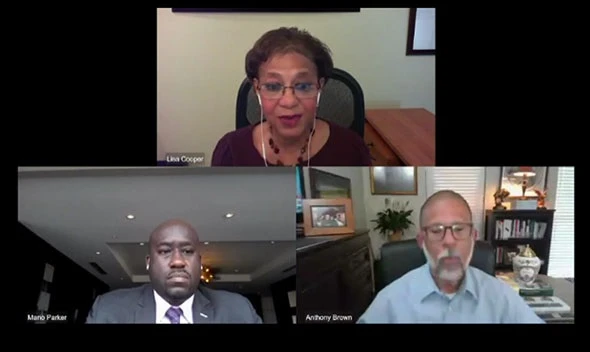COVID-19’s impact on Black communities: Steps and actions forward
June 19, 2020
Black Americans make up approximately 22% of coronavirus cases, yet they represent only 13% of the population. What underpins this disparity? And what must cities and citizens do better?
Bloomberg’s Black Professional Community, in partnership with Corporate Philanthropy, hosted a candid live discussion on the topic, sharing promising policy and social solutions to address gaps and inequalities, and areas where we all can make a difference.
Moderated by Mario Parker, Bloomberg News White House correspondent, the panel included Congressman Anthony Brown from Maryland’s 4th congressional district; Dr. Jennifer Ellis, Public Health team at Bloomberg Philanthropies; and Dr. Lisa Cooper, Bloomberg Distinguished Professor of Health Equity at Johns Hopkins University School of Medicine and Bloomberg School of Public Health.


Why the higher infection rates for black Americans?
A few explanations arose from the discussion.
- Black Americans are more likely to be critical workers for front-line jobs, including transportation, retail, EMT and nurses.
- On average, living conditions for people of color are more concentrated (in no small part to historical factors like segregation and wealth disparities), making it harder for people to protect themselves and others from infection.
- Chronic diseases that exacerbate coronavirus effects, like diabetes and asthma, are more likely to affect black Americans, who also tend to have less access to health care – so underlying health disparities and structural racism must be addressed in tandem.
Quality of information
With any novel disease like coronavirus, the body of knowledge is developing in real-time, and the explosion of information has also led to misinformation. Evaluating the quality of information coming out is difficult, and public health officials need to disseminate accurate updates. Dr. Cooper and Congressman Brown offered the following advice and insight to make that possible:
- Don’t give false reassurances to people; focus on the facts at hand and rely on experts.
- Partnerships between public health officials and leaders within the community are key. Officials need to work with established, trusted messengers in communities, through community leaders, artists, entertainers, and sports figures to help get out accurate messaging about how communities can protect themselves.
- Those trusted voices also extend to pastors, barbers, beauticians, local health care workers and the like within communities, particularly when it comes to contact tracing.
- Meet people where they are, on social media platforms and black-owned media.
What can you do?
One determinate of health is access to health care, both quality and quantity of services. During the discussion, Congressman Brown shared details of a new bill that he introduced during a pro forma session in Congress the following day, which offers incentives like federal grants for equipment and facilities, student loan repayment for medical and nursing school, and tax credits to health care providers in order to close gaps in the health care system that have left behind minorities and under-served communities.
The bill replicates the successful Health Enterprise Zones Act program previously piloted in Maryland. A 2018 study by Johns Hopkins concluded that Health Enterprise Zones Act was linked to reduced hospitalizations and costs to provide better health outcomes.
For individuals looking to make a difference, speakers made the following recommendations:
- Use your voice. Check on those who are most vulnerable, elderly relatives. And think: Who are my connections? And what is my platform to reach the audiences who need accurate information?
- Support law makers, policy-makers and leaders who we know are going to implement the causes important to our community. It is every voter’s responsibility to elect people who serve their best interests.
- Take the free contact tracing course offered by Johns Hopkins University
Learn more about Bloomberg’s recent Inclusion Dialogue on race